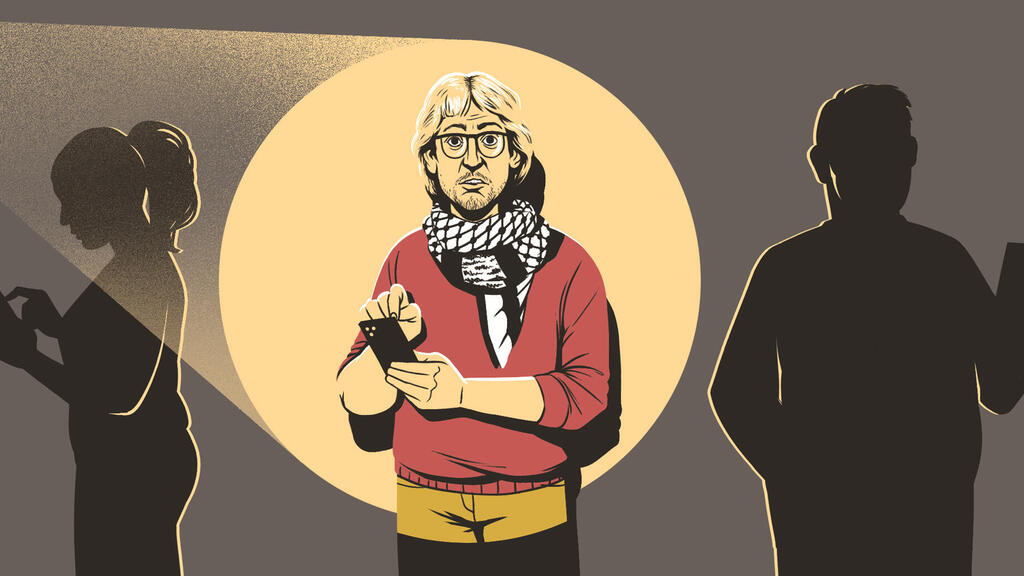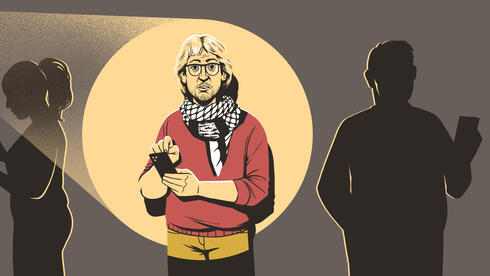
ISRAEL AT WAR
Doxing: A legitimate tool in the fight against anti-Semitism?
Until recently, doxing, a revenge act of shaming and exposure, was seen by most of the public as a negative act. It has now been adopted by pro-Israel and pro-Jewish activists in the fight against anti-Semitism
At the rally in support of Israel in Washington last week, a man in his 30s was recorded shouting at the participants "Heil Hitler!" With a raised hand salute. "He should have finished all of you," he exclaimed. The video spread on social media, quickly and mercilessly. One user posted a close-up of the anonymous person’s face and asked: "Can anyone identify him?".
"These are actually not children," said a woman in a video that garnered 1.7 million views on X (formerly Twitter) as she struggled to remove a poster of one of the abductees from the October 7 attack that had been firmly affixed to a street pole, "but civilians kidnapped by Israel." "Say hello," the photographer tells her, "you'll lose your job."
12 hours later the user StopAntisemitism updated about the event. "Chicago, Illinois - a woman who claims that Israelis kidnapped the civilians, and not Hamas, while destroying posters with the faces of the abductees, has been identified as Celine Khalife," he tweeted to his quarter of a million followers, adding, "Celine Khalife is employed at Chicago Mindful Psychotherapy as a sexual therapist for BIPOC (non-white people). Will Jewish patients feel comfortable under her care with such anti-Semitic and hateful views?"
At about the same time in Cambridge, Massachusetts, a van carrying huge digital signs circled one of the campuses at the prestigious Harvard University. Since the first week of the massacre, the van has been driving around the campus with a screen in the back of it projecting to passers-by the pictures and names of students who signed a letter accusing Israel of being responsible for the violence. Above their heads, the developer added the unrefined caption: "Harvard's leading anti-Semites." At the same time on X, venture capital investor and university graduate Bill Ackman tweeted that the names of the signatories should be published so that their opinions are known to the public. Ackman and others demanded that these names be published so that they would be prevented from being employed at companies they are involved in.
On the internet, as cyber expert Bruce Schneier once said, attack is easier than defense. And these days there is no more popular attack than doxing - the revenge tactic that developed in the 1990s when hackers would flood the internet with illegally obtained documents to reveal information about powerful people or large organizations that they thought the public would be interested in. Today doxing is much more personal, much less political, and above all vindictive. It usually involves exposing the personal details of individuals and private users for the purpose of intimidating, threatening and shaming. In the last 20 years, doxing has established itself as the favorite tool of white men against women, non-white people and members of the LGBTQ community. A kind of new generation outing.
Related articles:
Until this point in time and in an almost categorical manner, doxing was seen as a negative act that could lead to a real fear for people's lives and safety. But every now and then there comes a moment of social controversy, in which the tactic is once again perceived by parts of the public as a worthy tool for social change or indeed a necessary political act. When white supremacist marches took place in Charlottesville, various organizations began to isolate, identify and publicly expose some of the participants. "Damn Nazi" was a title attached to some of the participants on social media, which many would share and reshare. Even then, those engaged in the craft explained that it was a necessary act, since the march is a threat to the moral order and basic democratic norms. Doxing, therefore, was seen as a necessary act for them.
These days doxing is the favorite tool of pro-Israel and pro-Jewish activists to combat what they identify as anti-Semitic acts. The goal in this case is not only to put a mark of disgrace on the problematic people and to identify, condemn and shame, but is intended to create economic and social consequences in the real world - to threaten the current or future workplace, the study scholarship or university registration. For the participants in these acts, saluting with raised hands and indiscriminate chants towards an audience that express regret that the German mass murderers did not finish the job, also constitute threats to the moral social order.
But is everything that is happening today a proper and proportionate response overall? Does tearing down posters and spreading conspiracy theories meet the required threshold for the act of revenge? Is the effort to publicly shame and pressure business owners to fire those involved appropriate for the act? When you try to organize and rally an internet mob to take revenge and persecute, is this an act that promotes a healthy democratic society? We certainly cannot stand by and do nothing against manifestations of anti-Semitism, especially those that call for acts of violence, but where do we cross the line?
"You know who doesn't kill Palestinian queers? Hamas. You know who doesn't create an environmental disaster? Hamas. You know who hasn't committed international war crimes? Hamas. You know who doesn't commit genocide? Hamas," Marwa Maatia wrote in a story on one of the networks. "You know who doesn't try to claim religious supremacy? Hamas. You know who doesn't kill Israeli hostages? Hamas," she concluded.
Maatia is not a network influencer with thousands or hundreds of thousands of followers and the story disappeared after 24 hours, but StopAntisemitism amplified her words by thousands while mentioning her name and place of work (a podiatry specialist). "Can you imagine being her Jewish patient?" it asked and attached to the message links to her LinkedIn and Instagram pages, tagged the employer and attached a link to his website.
Does Maatia’s political position undermine the foundations of democracy and is it appropriate to send an internet mob towards her to harass her on social media and put pressure on her employer to take action against her? Is her opinion, however wrong, not protected in a democratic society? Should we as a society act against every person we don't like, even if we despise their views? Is it forbidden to engage in controversial political expression if it does not preach violence or hatred? And if others have already committed such an act, should we as bystanders further increase the act by re-sharing?
Not only that - does it really matter? The doxing attacks that multiplied in the last month were so intense and discouraging that today many pro-Palestinian demonstrators arrive on campuses and other areas wearing hats or masks and wrapping their keffiyeh around their faces so that they will not be associated with their politics. Is doxing worth it and does it really encourage patience and healthy conversation, or has the line been crossed?
